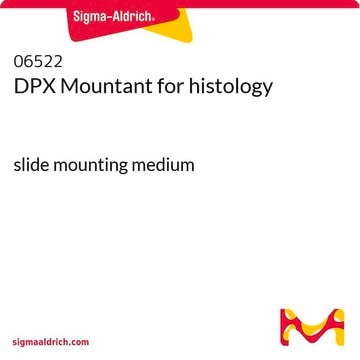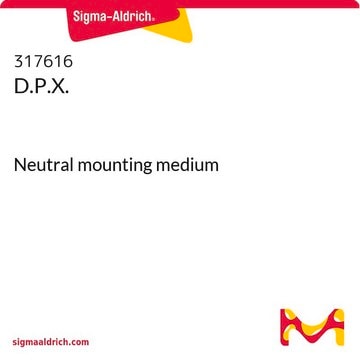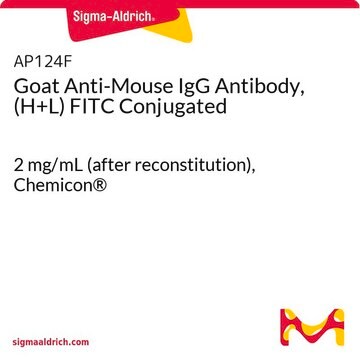MAB8743
Anti-Japanese Encephalitis Antibody, clone 6B4A-10
clone 6B4A-10, Chemicon®, from mouse
Synonym(s):
NAKAYAMA
Sign Into View Organizational & Contract Pricing
All Photos(1)
About This Item
UNSPSC Code:
12352203
eCl@ss:
32160702
NACRES:
NA.41
Recommended Products
biological source
mouse
Quality Level
antibody form
purified immunoglobulin
antibody product type
primary antibodies
clone
6B4A-10, monoclonal
species reactivity
human
manufacturer/tradename
Chemicon®
technique(s)
ELISA: suitable
immunofluorescence: suitable
isotype
IgG1
shipped in
wet ice
Specificity
Cross reactivity to St. Louis encephalitis (MSI-7), Japanese encephalitis (Nakayama), West Nile (EG 101), and Murray Valley encephalitis (Original) as determined by ELISA.
Application
Anti-Japanese Encephalitis Antibody, clone 6B4A-10 is an antibody against Japanese Encephalitis for use in ELISA & IF.
ELISA
Indirect immunofluorescence
Optimal working dilutions must be determined by end user.
Indirect immunofluorescence
Optimal working dilutions must be determined by end user.
Research Category
Infectious Diseases
Infectious Diseases
Research Sub Category
Infectious Diseases - Viral
Infectious Diseases - Viral
Physical form
Format: Purified
Supplied as a liquid in 0.02M phosphate buffer with 0.25M NaCl, pH 7.6, 0.1% sodium azide.
Storage and Stability
Maintain at 2-8°C in undiluted aliquots for up to 12 months.
Other Notes
Concentration: Please refer to the Certificate of Analysis for the lot-specific concentration.
Legal Information
CHEMICON is a registered trademark of Merck KGaA, Darmstadt, Germany
Disclaimer
Unless otherwise stated in our catalog or other company documentation accompanying the product(s), our products are intended for research use only and are not to be used for any other purpose, which includes but is not limited to, unauthorized commercial uses, in vitro diagnostic uses, ex vivo or in vivo therapeutic uses or any type of consumption or application to humans or animals.
Not finding the right product?
Try our Product Selector Tool.
Storage Class Code
10 - Combustible liquids
WGK
WGK 2
Flash Point(F)
Not applicable
Flash Point(C)
Not applicable
Certificates of Analysis (COA)
Search for Certificates of Analysis (COA) by entering the products Lot/Batch Number. Lot and Batch Numbers can be found on a product’s label following the words ‘Lot’ or ‘Batch’.
Already Own This Product?
Find documentation for the products that you have recently purchased in the Document Library.
Ana P Goncalvez et al.
Journal of virology, 82(14), 7009-7021 (2008-05-16)
Japanese encephalitis virus (JEV)-specific Fab antibodies were recovered by repertoire cloning from chimpanzees initially immunized with inactivated JE-VAX and then boosted with attenuated JEV SA14-14-2. From a panel of 11 Fabs recovered by different panning strategies, three highly potent neutralizing
Longitudinal studies in South Indian villages on Japanese encephalitis virus infection in mosquitoes and seroconversion in goats.
Rajendran, R, et al.
Tropical Medicine & International Health, 8, 174-181 (2003)
Kotaro Ishida et al.
PLoS pathogens, 19(10), e1011681-e1011681 (2023-10-11)
In the case of the Japanese encephalitis virus (JEV), the envelope protein (E), a major component of viral particles, contains a highly conserved N-linked glycosylation site (E: N154). Glycosylation of the E protein is thought to play an important role
Isolation of eastern equine encephalitis virus and West Nile virus from crows during increased arbovirus surveillance in Connecticut, 2000.
Beckwith, WH; Sirpenski, S; French, RA; Nelson, R; Mayo, D
The American Journal of Tropical Medicine and Hygiene null
Japanese encephalitis in Kerala, south India: can Mansonia (Diptera: Culicidae) play a supplemental role in transmission?
Arunachalam, N, et al.
Journal of Medical Entomology, 41, 456-461 (2004)
Our team of scientists has experience in all areas of research including Life Science, Material Science, Chemical Synthesis, Chromatography, Analytical and many others.
Contact Technical Service








